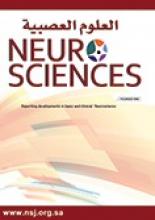Abstract
OBJECTIVE: To evaluate the long-term efficacy, safety, and retention rate of topiramate (TPM) in childhood refractory epilepsies.
METHODS: This study was designed as a single-center, retrospective study. Children with refractory epilepsy who has been followed in Behcet Uz Children’s Hospital, Izmir, Turkey, between 2003 and 2007 were included in the study.
RESULTS: The study population consisted of 43 boys (60.6%), and 28 girls (39.4%) aged between 2-18 years. Mean age was 8.83 (SD: 3.77) and mean duration of epilepsy was 3.89 (SD: 1.51) years. There were 41 children (57.7%) with mental retardation. Twenty-seven children had generalized epilepsy, and 44 children had localization-related epilepsy. Fifty-one children (71.8%) showed a good response to initial treatment. The retention at a mean of 32 months was 31 out of 71 children (43.6%), and approximately 18 children (25.3%) were seizure free. A loss of efficacy in long-term use occurred in 17 (33.3%) of initial responders. Adverse events were seen in 20 children (28.1%). There were no significant differences between the groups who continued and discontinued TPM treatment in long-term use.
CONCLUSION: As a result, it was determined that the drug was more effective and well tolerated in localization-related epilepsies, on long-term follow up.
- Copyright: © Neurosciences
Neurosciences is an Open Access journal and articles published are distributed under the terms of the Creative Commons Attribution-NonCommercial License (CC BY-NC). Readers may copy, distribute, and display the work for non-commercial purposes with the proper citation of the original work.






